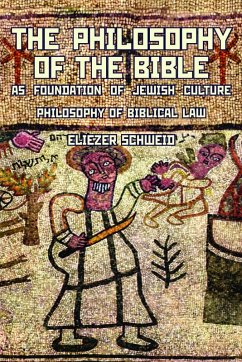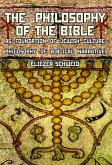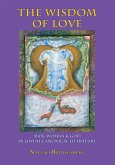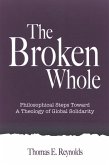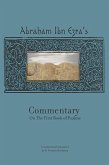Eliezer Schweid
The Philosophy of the Bible as Foundation of Jewish Culture (eBook, PDF)
Philosophy of Biblical Law
130,95 €
130,95 €
inkl. MwSt.
Sofort per Download lieferbar

0 °P sammeln
130,95 €
Als Download kaufen

130,95 €
inkl. MwSt.
Sofort per Download lieferbar

0 °P sammeln
Jetzt verschenken
Alle Infos zum eBook verschenken
130,95 €
inkl. MwSt.
Sofort per Download lieferbar
Alle Infos zum eBook verschenken

0 °P sammeln
Eliezer Schweid
The Philosophy of the Bible as Foundation of Jewish Culture (eBook, PDF)
Philosophy of Biblical Law
- Format: PDF
- Merkliste
- Auf die Merkliste
- Bewerten Bewerten
- Teilen
- Produkt teilen
- Produkterinnerung
- Produkterinnerung

Bitte loggen Sie sich zunächst in Ihr Kundenkonto ein oder registrieren Sie sich bei
bücher.de, um das eBook-Abo tolino select nutzen zu können.
Hier können Sie sich einloggen
Hier können Sie sich einloggen
Sie sind bereits eingeloggt. Klicken Sie auf 2. tolino select Abo, um fortzufahren.

Bitte loggen Sie sich zunächst in Ihr Kundenkonto ein oder registrieren Sie sich bei bücher.de, um das eBook-Abo tolino select nutzen zu können.
Eliezer Schweid is Professor Emeritus of Jewish Thought at the Hebrew University. He has published 40 books on general and specific areas of Jewish thought of all periods, and has commented frequently on the relevance of the legacy of Jewish thought to contemporary issues of Jewish and universal human concern. He is the recipient of the distinguished Israel Prize and two honorary doctorates. Leonard Levin teaches Jewish philosophy at the Jewish Theological Seminary of America in New York.
- Geräte: PC
- ohne Kopierschutz
- eBook Hilfe
- Größe: 0.49MB
- FamilySharing(5)
Andere Kunden interessierten sich auch für
![The Philosophy of the Bible as Foundation of Jewish Culture (eBook, PDF) The Philosophy of the Bible as Foundation of Jewish Culture (eBook, PDF)]() Eliezer SchweidThe Philosophy of the Bible as Foundation of Jewish Culture (eBook, PDF)130,95 €
Eliezer SchweidThe Philosophy of the Bible as Foundation of Jewish Culture (eBook, PDF)130,95 €![The Wisdom of Love (eBook, PDF) The Wisdom of Love (eBook, PDF)]() Naftali RothenbergThe Wisdom of Love (eBook, PDF)130,95 €
Naftali RothenbergThe Wisdom of Love (eBook, PDF)130,95 €![The Broken Whole (eBook, PDF) The Broken Whole (eBook, PDF)]() Thomas E. ReynoldsThe Broken Whole (eBook, PDF)26,95 €
Thomas E. ReynoldsThe Broken Whole (eBook, PDF)26,95 €![Sex Rewarded, Sex Punished (eBook, PDF) Sex Rewarded, Sex Punished (eBook, PDF)]() Diane KrigerSex Rewarded, Sex Punished (eBook, PDF)0,00 €
Diane KrigerSex Rewarded, Sex Punished (eBook, PDF)0,00 €![From Job to the Shoah (eBook, PDF) From Job to the Shoah (eBook, PDF)]() Reuven TravisFrom Job to the Shoah (eBook, PDF)13,95 €
Reuven TravisFrom Job to the Shoah (eBook, PDF)13,95 €![God, Evil, and Human Learning (eBook, PDF) God, Evil, and Human Learning (eBook, PDF)]() Fred Berthold Jr.God, Evil, and Human Learning (eBook, PDF)24,95 €
Fred Berthold Jr.God, Evil, and Human Learning (eBook, PDF)24,95 €![Rabbi Abraham Ibn Ezra's Commentary on the First Book of Psalms (eBook, PDF) Rabbi Abraham Ibn Ezra's Commentary on the First Book of Psalms (eBook, PDF)]() Abraham Ibn EzraRabbi Abraham Ibn Ezra's Commentary on the First Book of Psalms (eBook, PDF)130,95 €
Abraham Ibn EzraRabbi Abraham Ibn Ezra's Commentary on the First Book of Psalms (eBook, PDF)130,95 €-
-
-
Eliezer Schweid is Professor Emeritus of Jewish Thought at the Hebrew University. He has published 40 books on general and specific areas of Jewish thought of all periods, and has commented frequently on the relevance of the legacy of Jewish thought to contemporary issues of Jewish and universal human concern. He is the recipient of the distinguished Israel Prize and two honorary doctorates. Leonard Levin teaches Jewish philosophy at the Jewish Theological Seminary of America in New York.
Hinweis: Dieser Artikel kann nur an eine deutsche Lieferadresse ausgeliefert werden.
Dieser Download kann aus rechtlichen Gründen nur mit Rechnungsadresse in A, B, BG, CY, CZ, D, DK, EW, E, FIN, F, GR, HR, H, IRL, I, LT, L, LR, M, NL, PL, P, R, S, SLO, SK ausgeliefert werden.
Hinweis: Dieser Artikel kann nur an eine deutsche Lieferadresse ausgeliefert werden.
Produktdetails
- Produktdetails
- Verlag: Academic Studies Press
- Seitenzahl: 216
- Erscheinungstermin: 1. Januar 2009
- Englisch
- ISBN-13: 9781618110480
- Artikelnr.: 56998869
- Verlag: Academic Studies Press
- Seitenzahl: 216
- Erscheinungstermin: 1. Januar 2009
- Englisch
- ISBN-13: 9781618110480
- Artikelnr.: 56998869
- Herstellerkennzeichnung Die Herstellerinformationen sind derzeit nicht verfügbar.
Eliezer Schweid (1929-2022) was Professor Emeritus of Jewish Thought at the Hebrew University. He published over forty books in general and specific areas of Jewish thought of all periods, and commented frequently on the relevance of the legacy of Jewish thought to contemporary issues of Jewish and universal human concern. He was the recipient of the distinguished Israel Prize and two honorary doctorates. Leonard Levin teaches Jewish philosophy at the Academy for Jewish Religion, Yonkers, NY.
Preface. A Fresh Reading -- Freeing Ourselves of Old Stereotypes. The
Complementarity of Law and Narrative. 1. The Law of the Kingdom of God.
Exodus from Slavery to Freedom as a Legislative-Politcal Act: The Process
of Formation and Establishment of the Kingdom of God in His People.
Institutionalizing the Ideal of "Kingdom of God" in His People. The Return
to Slavery and the Dilemma of the Difference between the Law of Slavery and
the Law of Freedom. The Ideational Background for Realizing the Transition:
What is the Difference between the Law of Slavery and the Law of Freedom?
The Gradual Descent of the Kingdom of God from the Mythic to the Historical
Plane: From Prophecy to Wisdom. The Idea of the Covenant and the Basic
Values of the Law of Freedom and Justice. Judicial Justice as Covenantal
Principle - Its General Application and the Concept of Truth. Social
Justice as Fulfillment of the Vison of Creation. The Problem of Poverty and
the Ethic of Neighborly Love. Statutory Law that Regenerates the
Egalitarian Basis of Social Justice. The Structure of the Kingdom of
Priests: The Problem of Authority and Cooperative Functioning of All the
Powers of Government. Between Israel and the Nations. 2. Deuteronomy (the
"Second Torah") - The Beginning of Renewal of the Written Torah as Oral
Torah. The Difference between Moses' and Joshua's Leadership and the
Perpetuity of Moses' Leadership in the People. Deuteronomy's Uniqueness as
Embodiment of Moses' Leadership of the People. The Difference between Moses
and Joshua. The Problem of Succession Continued. Deuteronomy as Oral Law.
Legislative Innovations in Deuteronomy. The Transition in Deuteronomy from
the Plane of myth to History. When and by Whom Was Deuteronomy Written? The
Transition from the "Scribes" to the "Men of the Great Synagogue". 3. The
Partnership of Man and Woman in the Law of Moses and the Prophets. Equality
and Inequality of Persons in the Reciprocal Relation of Individuals and the
Community. The Reciprocal Relation of Individual and Community. The
Hierarchical Relation of Man and Woman. Man's Acquistion-Ownership of
Woman. "Acquisition of Relationship" versus Acquisition of Property. How is
the Husband's "Acquisition" of His Wife Expressed? Woman's Autonomy in the
Light of the Torah's Legislation. The Difference Between the Wife's Status
vis-a-vis Her Husband and Her Status as Mother vis-a-vis Her Children. The
Myth of Mankind's Creation as a Couple in God's Image: Destiny, Sin and
Redemption. 4. Universalism and Particularism - Openness to Foreign
Cultures and Isolation from their Influence. Index.
Complementarity of Law and Narrative. 1. The Law of the Kingdom of God.
Exodus from Slavery to Freedom as a Legislative-Politcal Act: The Process
of Formation and Establishment of the Kingdom of God in His People.
Institutionalizing the Ideal of "Kingdom of God" in His People. The Return
to Slavery and the Dilemma of the Difference between the Law of Slavery and
the Law of Freedom. The Ideational Background for Realizing the Transition:
What is the Difference between the Law of Slavery and the Law of Freedom?
The Gradual Descent of the Kingdom of God from the Mythic to the Historical
Plane: From Prophecy to Wisdom. The Idea of the Covenant and the Basic
Values of the Law of Freedom and Justice. Judicial Justice as Covenantal
Principle - Its General Application and the Concept of Truth. Social
Justice as Fulfillment of the Vison of Creation. The Problem of Poverty and
the Ethic of Neighborly Love. Statutory Law that Regenerates the
Egalitarian Basis of Social Justice. The Structure of the Kingdom of
Priests: The Problem of Authority and Cooperative Functioning of All the
Powers of Government. Between Israel and the Nations. 2. Deuteronomy (the
"Second Torah") - The Beginning of Renewal of the Written Torah as Oral
Torah. The Difference between Moses' and Joshua's Leadership and the
Perpetuity of Moses' Leadership in the People. Deuteronomy's Uniqueness as
Embodiment of Moses' Leadership of the People. The Difference between Moses
and Joshua. The Problem of Succession Continued. Deuteronomy as Oral Law.
Legislative Innovations in Deuteronomy. The Transition in Deuteronomy from
the Plane of myth to History. When and by Whom Was Deuteronomy Written? The
Transition from the "Scribes" to the "Men of the Great Synagogue". 3. The
Partnership of Man and Woman in the Law of Moses and the Prophets. Equality
and Inequality of Persons in the Reciprocal Relation of Individuals and the
Community. The Reciprocal Relation of Individual and Community. The
Hierarchical Relation of Man and Woman. Man's Acquistion-Ownership of
Woman. "Acquisition of Relationship" versus Acquisition of Property. How is
the Husband's "Acquisition" of His Wife Expressed? Woman's Autonomy in the
Light of the Torah's Legislation. The Difference Between the Wife's Status
vis-a-vis Her Husband and Her Status as Mother vis-a-vis Her Children. The
Myth of Mankind's Creation as a Couple in God's Image: Destiny, Sin and
Redemption. 4. Universalism and Particularism - Openness to Foreign
Cultures and Isolation from their Influence. Index.
Preface. A Fresh Reading -- Freeing Ourselves of Old Stereotypes. The
Complementarity of Law and Narrative. 1. The Law of the Kingdom of God.
Exodus from Slavery to Freedom as a Legislative-Politcal Act: The Process
of Formation and Establishment of the Kingdom of God in His People.
Institutionalizing the Ideal of "Kingdom of God" in His People. The Return
to Slavery and the Dilemma of the Difference between the Law of Slavery and
the Law of Freedom. The Ideational Background for Realizing the Transition:
What is the Difference between the Law of Slavery and the Law of Freedom?
The Gradual Descent of the Kingdom of God from the Mythic to the Historical
Plane: From Prophecy to Wisdom. The Idea of the Covenant and the Basic
Values of the Law of Freedom and Justice. Judicial Justice as Covenantal
Principle - Its General Application and the Concept of Truth. Social
Justice as Fulfillment of the Vison of Creation. The Problem of Poverty and
the Ethic of Neighborly Love. Statutory Law that Regenerates the
Egalitarian Basis of Social Justice. The Structure of the Kingdom of
Priests: The Problem of Authority and Cooperative Functioning of All the
Powers of Government. Between Israel and the Nations. 2. Deuteronomy (the
"Second Torah") - The Beginning of Renewal of the Written Torah as Oral
Torah. The Difference between Moses' and Joshua's Leadership and the
Perpetuity of Moses' Leadership in the People. Deuteronomy's Uniqueness as
Embodiment of Moses' Leadership of the People. The Difference between Moses
and Joshua. The Problem of Succession Continued. Deuteronomy as Oral Law.
Legislative Innovations in Deuteronomy. The Transition in Deuteronomy from
the Plane of myth to History. When and by Whom Was Deuteronomy Written? The
Transition from the "Scribes" to the "Men of the Great Synagogue". 3. The
Partnership of Man and Woman in the Law of Moses and the Prophets. Equality
and Inequality of Persons in the Reciprocal Relation of Individuals and the
Community. The Reciprocal Relation of Individual and Community. The
Hierarchical Relation of Man and Woman. Man's Acquistion-Ownership of
Woman. "Acquisition of Relationship" versus Acquisition of Property. How is
the Husband's "Acquisition" of His Wife Expressed? Woman's Autonomy in the
Light of the Torah's Legislation. The Difference Between the Wife's Status
vis-a-vis Her Husband and Her Status as Mother vis-a-vis Her Children. The
Myth of Mankind's Creation as a Couple in God's Image: Destiny, Sin and
Redemption. 4. Universalism and Particularism - Openness to Foreign
Cultures and Isolation from their Influence. Index.
Complementarity of Law and Narrative. 1. The Law of the Kingdom of God.
Exodus from Slavery to Freedom as a Legislative-Politcal Act: The Process
of Formation and Establishment of the Kingdom of God in His People.
Institutionalizing the Ideal of "Kingdom of God" in His People. The Return
to Slavery and the Dilemma of the Difference between the Law of Slavery and
the Law of Freedom. The Ideational Background for Realizing the Transition:
What is the Difference between the Law of Slavery and the Law of Freedom?
The Gradual Descent of the Kingdom of God from the Mythic to the Historical
Plane: From Prophecy to Wisdom. The Idea of the Covenant and the Basic
Values of the Law of Freedom and Justice. Judicial Justice as Covenantal
Principle - Its General Application and the Concept of Truth. Social
Justice as Fulfillment of the Vison of Creation. The Problem of Poverty and
the Ethic of Neighborly Love. Statutory Law that Regenerates the
Egalitarian Basis of Social Justice. The Structure of the Kingdom of
Priests: The Problem of Authority and Cooperative Functioning of All the
Powers of Government. Between Israel and the Nations. 2. Deuteronomy (the
"Second Torah") - The Beginning of Renewal of the Written Torah as Oral
Torah. The Difference between Moses' and Joshua's Leadership and the
Perpetuity of Moses' Leadership in the People. Deuteronomy's Uniqueness as
Embodiment of Moses' Leadership of the People. The Difference between Moses
and Joshua. The Problem of Succession Continued. Deuteronomy as Oral Law.
Legislative Innovations in Deuteronomy. The Transition in Deuteronomy from
the Plane of myth to History. When and by Whom Was Deuteronomy Written? The
Transition from the "Scribes" to the "Men of the Great Synagogue". 3. The
Partnership of Man and Woman in the Law of Moses and the Prophets. Equality
and Inequality of Persons in the Reciprocal Relation of Individuals and the
Community. The Reciprocal Relation of Individual and Community. The
Hierarchical Relation of Man and Woman. Man's Acquistion-Ownership of
Woman. "Acquisition of Relationship" versus Acquisition of Property. How is
the Husband's "Acquisition" of His Wife Expressed? Woman's Autonomy in the
Light of the Torah's Legislation. The Difference Between the Wife's Status
vis-a-vis Her Husband and Her Status as Mother vis-a-vis Her Children. The
Myth of Mankind's Creation as a Couple in God's Image: Destiny, Sin and
Redemption. 4. Universalism and Particularism - Openness to Foreign
Cultures and Isolation from their Influence. Index.
